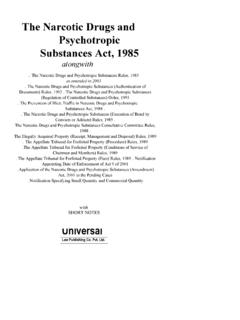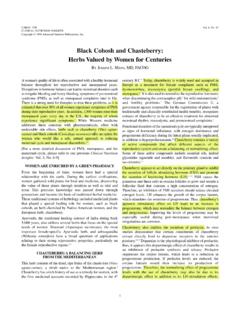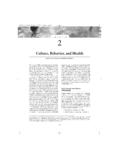Transcription of NATIONAL POLICY ON NARCOTIC DRUGS AND …
1 Page 1 of 47 N A T I O N A L P O L I C Y O N NA R C O T I C D R U G S A N D P S Y C H O T R O PI C S U B S T A N C E S I NT R ODU C T I O N 1. NARCOTIC DRUGS and psychotropic Substances have several medical and scientific uses. However, they can be and are also abused and trafficked. India's approach towards NARCOTIC DRUGS and psychotropic Substances is enshrined in Article 47 of the Constitution of India which mandates that the State shall endeavour to bring about prohibition of the consumption except for medicinal purposes of intoxicating drinks and of DRUGS which are injurious to health . The same principle of preventing use of DRUGS except for medicinal use was also adopted in the three international conventions on drug related matters, viz.
2 , Single Convention on NARCOTIC DRUGS , 1961, Convention on psychotropic Substances, 1971 and the UN Convention Against Illicit Traffic in NARCOTIC DRUGS and psychotropic Substances, 1988. India has signed and ratified these three conventions. India s commitment to prevention of drug abuse and trafficking predates the coming into force of the three conventions. 2. The NARCOTIC DRUGS and psychotropic Substances (NDPS) Act, 1985 was framed taking into account India s obligations under the three UN drug Conventions as well as Article 47 of the Constitution mentioned in para 1 above. This Act prohibits, except for medical or scientific purposes, the manufacture, production, trade, use, etc.
3 Of NARCOTIC DRUGS and psychotropic substances. 3. The Governments POLICY has thus been to promote their use for medical and scientific purposes while preventing their diversion from licit sources, and prohibiting illicit traffic and abuse. Unlike the earlier Opium Acts and the Dangerous DRUGS Act which it replaced, the NDPS Act has given the power of enforcement to various central and state law enforcement agencies, thus spreading the net of law enforcement far and wide. The NDPS Act It is also possible for the central and State Governments to notify any new class of officers of any department to enforce. 4. The NDPS Act divides the powers and responsibility of regulation of licit activities.
4 Section 9 of the Act has listed various activities which the Central Government can, by rules, regulate while section 10 lists various activities which the State Governments can, by rules, regulate. Thus, we have NDPS Rules of the Central Government and the State NDPS Rules framed by each State Government under the same Act. These are enforced by the Central or concerned State Government. Page 2 of 47 5. The NDPS Act has created statutory authorities such as the narcotics Commissioner (Section 5), the Competent Authority (Section 68D) and the Administrator (Section 68G). The organization headed by the narcotics Commissioner is known as the Central Bureau of narcotics (CBN).
5 Another authority called the narcotics Control Bureau was created through a notification under Section 4 of the Act. Each of these authorities has specified functions. 6. Government business is divided in the Central Government as per the Allocation of Business Rules. As per these Rules, the NDPS Act is administered by the Ministry of Finance, Department of Revenue. However, matters pertaining to drug Demand Reduction are handled by the Ministry of Social Justice & Empowerment (MSJE). MSJE supports various NGOs involved in drug Demand Reduction. Ministry of Health, Government of India, which is responsible for all health issues, runs several drug de-addiction centres in the Government hospitals across the country.
6 The narcotics Control Bureau, under the Ministry of Home Affairs (MHA), coordinates actions by various functionaries (Central and State) under the NDPS Act. 7. The State Governments also have their own Health Departments and Social Welfare Departments each of which has its own set of activities relating to drug Demand Reduction. NEED FOR T HIS PO LIC Y 8. As discussed above, several departments and organisations of the Central and State Government are involved in various activities relating to NARCOTIC DRUGS and psychotropic substances. Some of these are listed below: Action Government/ Department/ Organisation 1. drug law enforcement Central Government 1. narcotics Control Bureau 2.
7 Central Bureau of narcotics 3. Directorate General of Revenue Intelligence 4. Commissionerates of Customs 5. Commissionerates of Central Excise 6. Coast Guard State Governments Vary from State to State, usually: 1. State Police 2. State Excise Officers 2. Identification and destruction of illicit opium and cannabis crops Satellite survey of suspected areas Central Economic Intelligence Bureau (CEIB) coordinates the survey and shares the information with NCB and Page 3 of 47 Action Government/ Department/ Organisation CBN. Central Government 1. narcotics Control Bureau, MHA, GOI 2. Central Bureau of narcotics , Gwalior, DoR, GOI State Governments Vary from State to State, usually: 1. State Police 2.
8 State Excise Officers 3. Framing rules to regulate various activities indicated in Section 9 of the NDPS Act, 1985 Department of Revenue, Ministry of Finance, Government of India 4. Framing rules to regulate various activities indicated in Section 10 of the NDPS Act, 1985 State Governments 5. Licensing and supervision of cultivation of opium poppy Central Bureau of narcotics , Gwalior 6. Licensing of manufacture of NARCOTIC DRUGS Central Bureau of narcotics , Gwalior 7. Drying and export of opium Chief Controller of Factories, New Delhi 8. Extraction of alkaloids from opium Chief Controller of Factories, New Delhi 9. Import of alkaloids of opium Chief Controller of Factories, New Delhi 10.
9 Allocation of INCB approved estimates of NARCOTIC DRUGS as quotas and subsequent monitoring Central Bureau of narcotics , Gwalior 11. Supply of samples of NARCOTIC DRUGS to testing labs, training institutions, etc. Chief Controller of Factories, New Delhi 12. Control on sale, use, consumption, movement, etc. of NARCOTIC DRUGS State Governments usually through their State Excise Departments 13. Control on import and export of NARCOTIC DRUGS and psychotropic substances and precursors Central Bureau of narcotics , Gwalior 14. Registration of import contracts for poppy seeds Central Bureau of narcotics , Gwalior 15. Regulation of manufacture, trade, etc. of psychotropic State DRUGS Controllers under the NDPS Rules read with DRUGS and Page 4 of 47 Action Government/ Department/ Organisation substances Cosmetics Act and Rules.
10 narcotics Commissioner for import & export 16. Receipt and monitoring of returns regarding controlled substances under the NDPS (Regulation of Controlled Substances) Order, 1993 narcotics Control Bureau, MHA, GOI 17. Controlled delivery operations Director General, narcotics Control Bureau 18. Seizure, freezing and forfeiture of properties of drug traffickers, their relatives and associates Competent Authority appointed under the NDPS Act (Delhi, Chennai, Mumbai & Kolkata, presently) 19. Management of properties seized or forfeited Administrator appointed under the NDPS Act (Delhi, Chennai, Mumbai & Kolkata, presently) 20. Supply of opium to addicts State Governments, usually through the State Excise Departments 21.





